In this article
Bringing home a new Poodle or a Poodle mix is exciting. You want to play with your new little friend, make them comfortable, and get them settled in their new home. While this is great, and you should spoil your little friend, it’s crucial not to forget to immediately begin potty training your Poodle puppy.
If you’re a first-time pet parent, establishing a consistent training routine can seem overwhelming. However, getting your Poodle potty trained as a puppy is essential, and it’s best to do it in the early days.
In the guide below, we’ll give you our favorite steps for training a Poodle.

How to Potty Train a Poodle
When potty training a Poodle, it’s best to start when they are still puppies. You need to be clear, but gentle and consistent, yet patient when getting your Poodle on a routine potty schedule.
1. Create a Routine
Poodle puppies are known for responding well to established routines. Establishing a schedule now doesn’t mean you won’t be able to change it as your puppy matures. However, a routine is vital if you want your pup to learn to go potty outside your home.
During the Poodle’s first few weeks in your family, you need a strict schedule for the dog to adhere to. Here are a few instances where you should create a routine for your dog.
- Eating
- Training
- Playtime
- Potty breaks
- Alone time

2. Purchase a Leash
Before training your Poodle, purchase a leash and harness that will fit your pet. Using a leash during your puppy training accomplishes two things at once.
Not only does the leash teach your pet where it’s okay to go potty in the yard, but it also allows you to conduct leash training, something you will need when the dog goes for walks. If all goes according to plan, within about 3 weeks of taking your Poodle to their designated potty spots, you should no longer have a problem.
3. Set Your Expectations According to Biology
Puppies do not have a developed bladder; it is not until puppies are about 4 to 5 months old that they will start developing bladder control. Their tiny bladders can not retain much volume, either. You will need to anticipate their need to use the bathroom and take them outside more often. If your puppy is 2 months old, you must take them outside every 2 hours. If your puppy is 3 months old, take them out every 3 hours.
You should also take your puppy outside 15 minutes after every meal, and every time they wake up from a nap. Make sure you take poop bags!
4. Learn to Read Body Language
A very important part of successfully potty training your Poodle will depend on you learning to recognize the behavioral cues your puppy is showing when they need to relieve themselves so you can take them out before they have an accident. Dogs usually start moving and sniffing around while trying to find the best place to relieve themselves.
Puppies will also do a squatting-like movement when they pee. Observing your puppy’s behavior will go a long way to support their learning and prevent accidents and frustration.
5. Reward and Reinforce
No matter which part of the training you are working on with your Poodle, it’s best to use a positive reinforcement reward system. Whether you are a first-time pet owner or a seasoned pet parent, it’s crucial that following commands and good behavior is rewarded, and you need to give your Poodle lots of praise as well.
Praise, of course, is easy. A “good boy” or “very good” is easy to say, and your dog will know from the words and your tone that they did a good job. Treats can be a bit trickier because you must determine what your pet likes best. In most cases, however, your Poodle will be happy with a treat or a toy for good behavior.
Never yell at, hit, or demean your Poodle for having accidents in the house or even for not following commands. Remember, your dog is just a baby, and yelling at them is counterproductive and cruel.
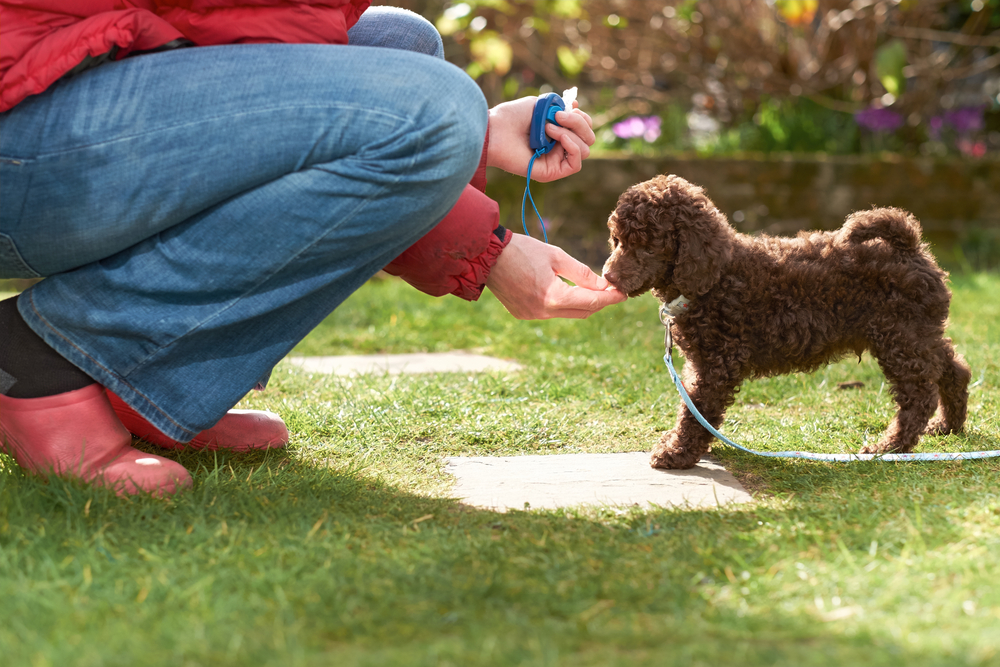
6. Clean Up Any Accident Immediately
If your puppy has an accident at home, it is normal, and you should refrain from yelling or getting angry at them. Instead, focus on immediately cleaning the area since dogs use the scent of their biological waste to recognize those familiar areas. In other words, you want to prevent them from thinking the area is their toilet.
If you're looking for an all-in-one, pet-friendly, enzyme cleaner, we highly recommend the Hepper Advanced Bio-Enzyme Pet Stain & Odor Eliminator Spray.
- ADVANCED ENZYMATIC CLEANER - Penetrates the most stubborn smells and stains at the deepest molecular...
- FOR ANY MESS, ON ANY SURFACE - This pet odor eliminator cleans your carpets, floors, furniture,...
- FRESH, NATURAL ODOR - Our unique formulation doesn't rely on dangerous or unpleasant chemical...
It eliminates tough stains and odors easily and is excellent for accident prevention. Plus, it comes with a 100% satisfaction guarantee! Click here to order now.
At Dogster, we’ve admired Hepper for many years, and decided to take a controlling ownership interest so that we could benefit from the outstanding products of this cool pet company!
7. Schedule Adjustments
Once your Poodle learns where their designated areas are and starts to develop bladder control, you can begin reducing the frequency of their potty breaks. However, you should keep in mind that changes should be gradual, and you will still need to take your Poodle outside every morning after they wake up and every evening before going to sleep, as well as a couple of times during the day. It’s the life of a pet parent!

What if Your Poodle Isn’t a Puppy?
Sometimes, the Poodle you fall in love with and give a forever home isn’t a puppy, so you might wonder how you can train a full-grown dog. You’ll need to read their body language and establish a firm routine for your adult Poodle, just as you would a young puppy.
It’s essential not to free-feed your adult Poodle since you won’t know when they eat and when they need to go to the potty. Crate training is another technique that works well for older Poodles. When you take the dog outside, but they don’t go potty, simply return, put them in the crate for 10 to 15 minutes, then take them outside to try again. Once your dog uses the bathroom, remember to provide praise and treats for a job well done.
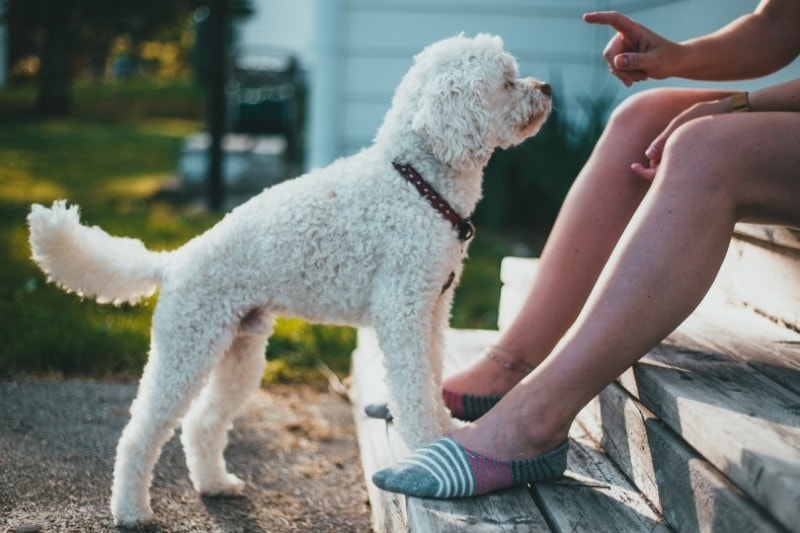

Final Thoughts
Caring for a Poodle puppy is a fun time in your family’s life. However, in the excitement of getting the dog settled into their new home, it can be easy to forget to set a routine and start training your new friend to use the bathroom outside.
Following the steps above will ensure that your Poodle puppy is properly trained and will continue to relieve themselves when brought outside. As your Poodle develops and learns the rules, your strict routine can be adjusted to something less rigid. Before you know it, your Poodle will be housetrained, and you won’t have to break out your cleaning supplies as often!
Featured Image Credit: ThamKC, Shutterstock
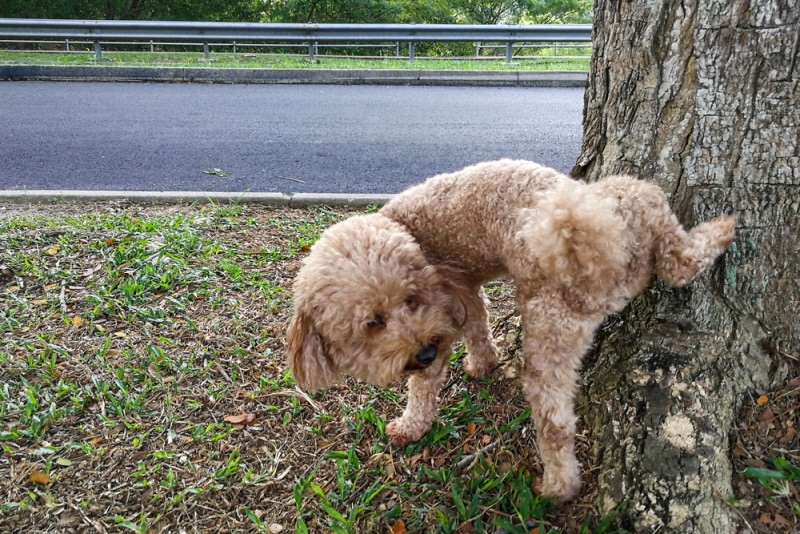


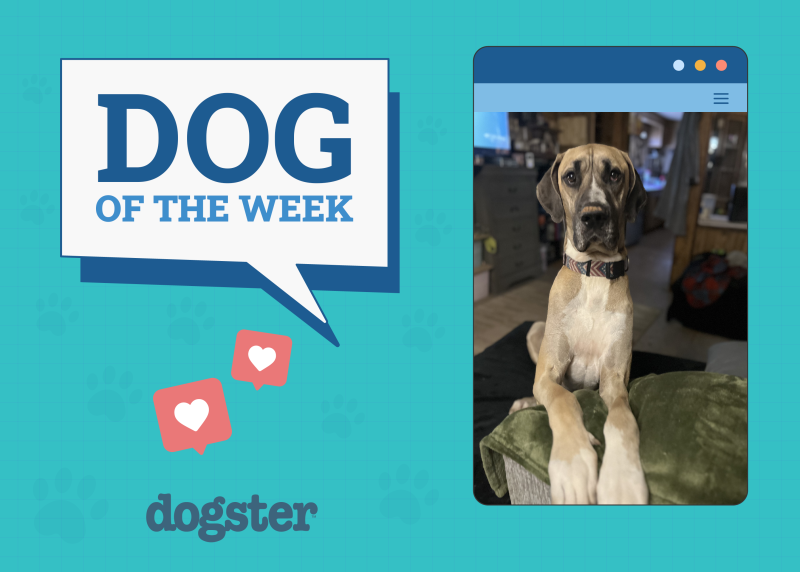
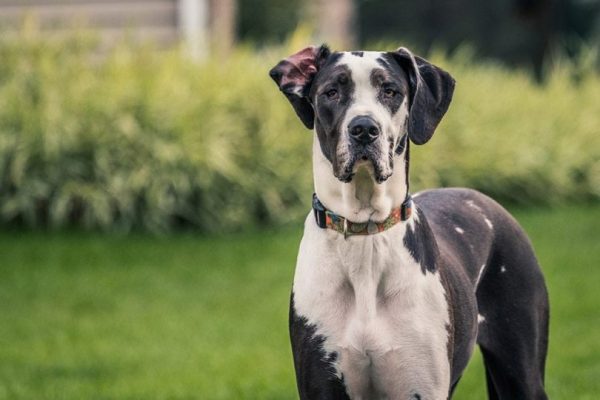



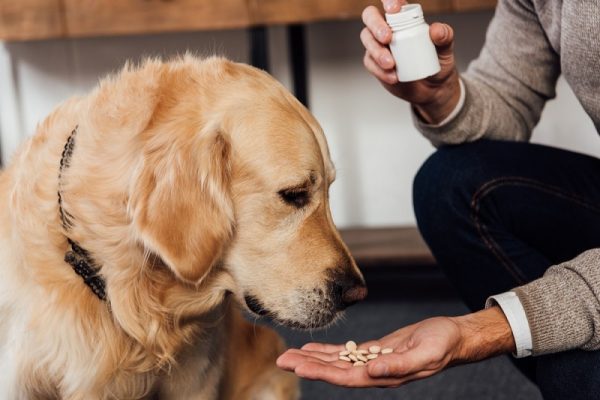
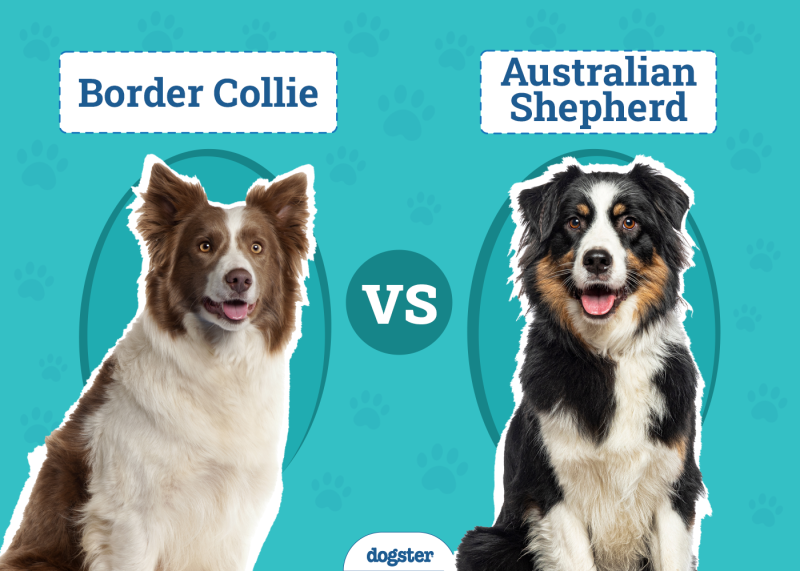

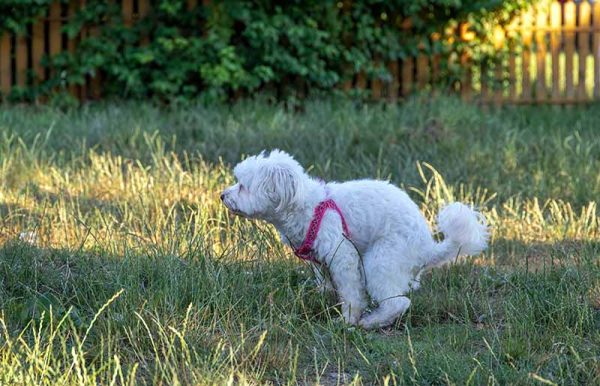
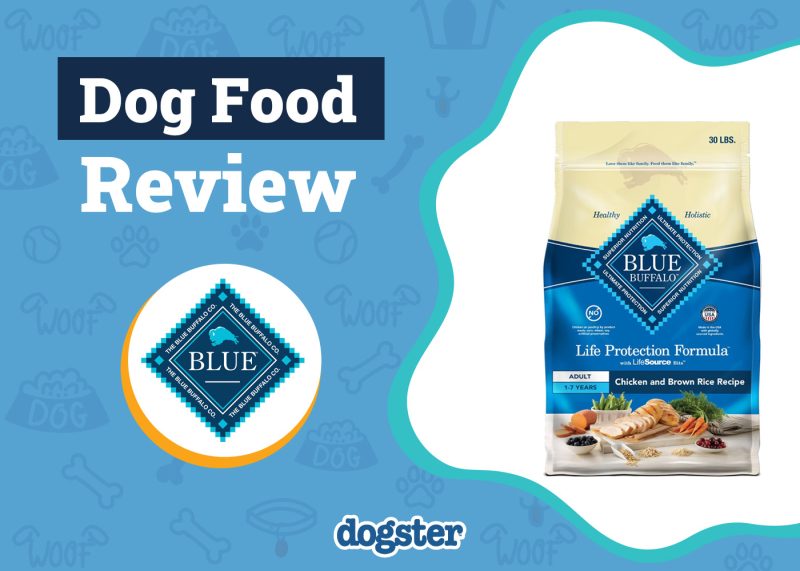
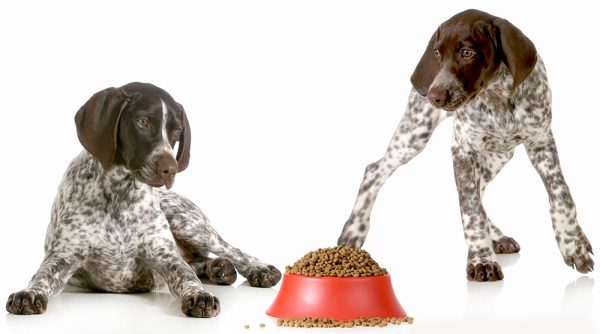



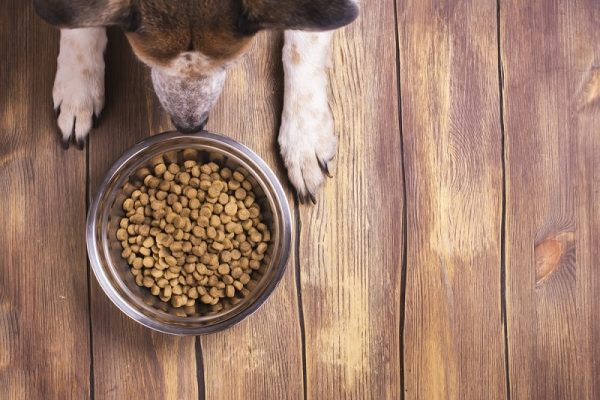
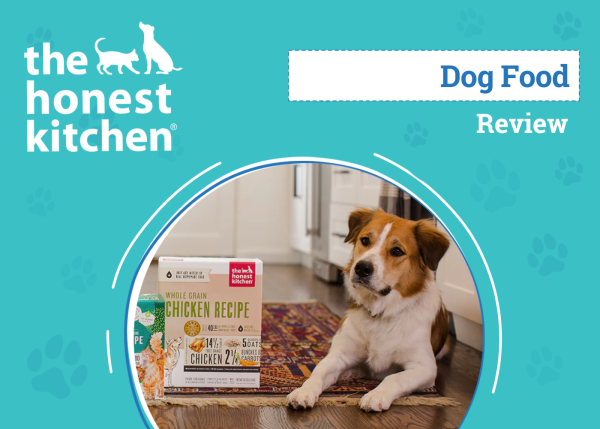
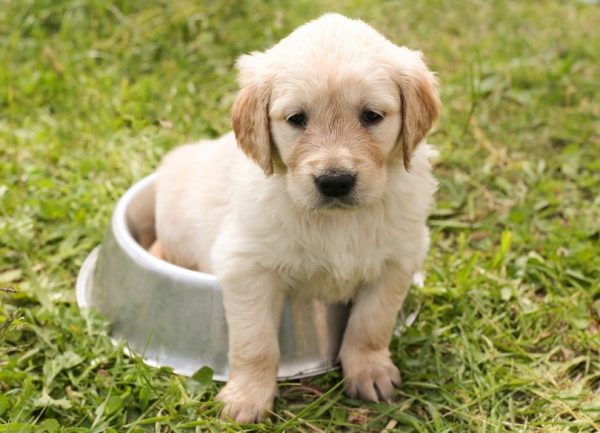



2 Responses
I am up a 4 month old Bernedoodle. I am concerned that she will be difficult to potty train because she has only been going on puppy pads instead of outside. Any tips on getting here to change that behavior and go outside?